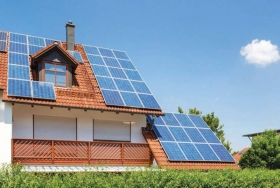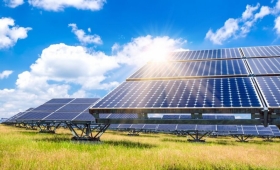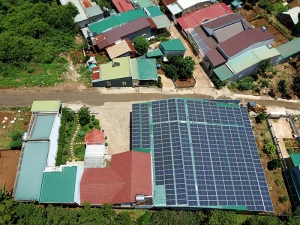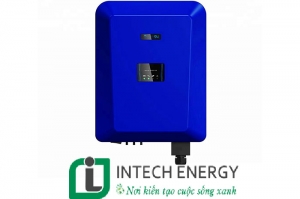What are solar lights?
- 10-01-2022 09:01:07
- 127
Solar lights are especially effective when used in rural and remote areas where there is an unstable or no electricity grid. In the very dangerous pass sections at night in the Central Highlands, solar street lights are also applied to provide light to ensure safety for nighttime drivers.

History of solar LED lights
As of 2016, LEDs use only about 10% of the energy an incandescent light bulb requires. Because of this extremely good effect, most solar lights use LED bulbs.
Composition
1. Lighting equipment
- Optimum savings on energy consumption.
- Low heat, friendly to the environment and surrounding trees.
- Extremely long lifespan.
- Stable light source, no harm to eyes.
2. Solar panel (Solar panel)
When streams of sunlight (also called photons) "land" on the surface of the photovoltaic cell, they "give" energy to the atoms in the silicon layer. It promotes an electron from the upper shell to the lower shell. This impulse causes the electron to move freely and generates an electric current. The more sunlight hitting the surface of the panel, the more electrons will be able to move freely and the more efficient the photo-electrical process will be.
The photovoltaic conversion cells will then be packaged into a large plate by clad in glass, wrapped in an aluminum frame called a solar panel (usually about 36 - 72 cells).
3. Battery (electrical storage battery)
The battery stored inside the solar light is usually the type that uses gel electrolysis technology with high efficiency in terms of deep discharge, so that it can be used well in extreme temperature ranges. There are also types such as Lithium-ion (quite common in high-end solar lamps), lead acid, nickel cadmium, etc.
This part of the solar lights is indispensable, it helps to store the electricity generated by the panels during the day and supply that power to the lights to light up at night. It can be said that without battery storage, solar lights are almost "useless".
Benefit:
- Solar-powered lights will be much easier for users to install, arrange and maintain because they do not require any electrical wiring to connect to the grid.
- Solar electric lights can bring many benefits to homeowners with significant reductions in maintenance costs and maximum energy savings for outdoor lighting (up to 100% electricity savings). ).
- Solar powered lights are extremely necessary for remote areas with no electricity grid or places with unstable electricity. This overcomes a lot of inadequacies such as women and children will feel safer when going out at night, traffic will definitely be safer when night falls, the lack of evening light. It also affects people's working time and leads to many consequences for economic development.
- Extremely eco-friendly: Unlike kerosene lamps that emit a lot of CO2, conventional electric lights are ultimately associated with CO2 as the majority of grid electricity is generated from burning fossil fuels. On the other hand, solar LED lights operate on a completely clean energy source from sunlight.
Classify
- Solar street lights.
- Wall mounted solar lights.
- Gate pole lights use solar power.
- Solar powered garden lights.
- Traffic light.
- Mosquito catcher lamp.
- Ornamental lights.
- Decorative LED string lights.
News other
-

How many types of solar inverters are there?
10-01-2022 17:15:06 Details
-

Install a solar battery system properly
10-01-2022 16:25:02 Details
-

The Vietnam Renewable Energy Community organizes a Caravan journey towards the Central region
10-01-2022 09:12:28 Details
-

Solar panel system rotates in the direction of the sun – Up to 30% higher efficiency
10-01-2022 09:11:15 Details
-

Why is solar power in the Central Highlands extremely ”hot” in 2020?
10-01-2022 09:04:02 Details
-

knowledge of installing solar panels: install batteries beyond the rated capacity of grid-tied inverters.
10-01-2022 08:56:11 Details


